Creation is not easy, welcome to pay attention, welcome to reward 🙂
Taking advantage of the recent reduction of Tencent’s major shareholder MIH, I spent some time in the afternoon to look through Tencent’s prospectus, and sorted out the previous changes of shareholders’ equity before Tencent’s IPO, as well as the reduction of major shareholders and the founding team’s shares after the IPO. Share with everyone.
Note: For the convenience of comparison, the number of shares is converted into the current standard statistics after previous stock splits.
1. Initial shareholding by the founding team: March 2000
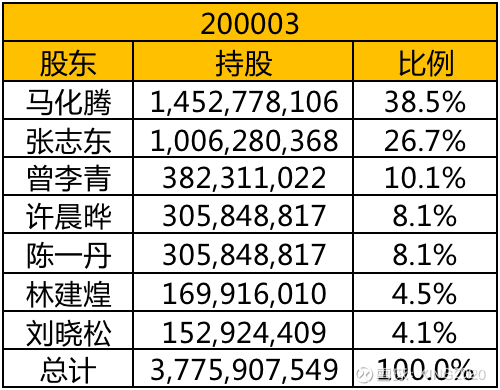
Not to mention the five founding shareholders of Tencent. Liu Xiaosong and Lin Jianhuang became shareholders because they helped Tencent obtain corresponding intermediary shares from IDG and Yingke financing respectively. Looking at the history and the future, the two of them are absolutely insurmountable peaks in the pimping (FA) world. The two hold a total of 320 million shares of Tencent, and the current price is close to $10 billion. . .
2. The first round of financing: IDG, Yingke injected capital in July 2000
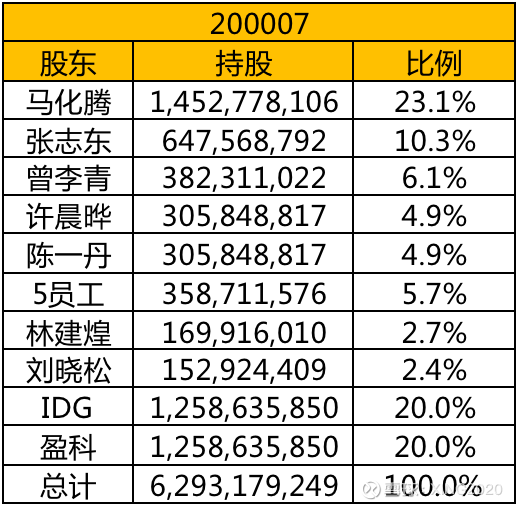
Tencent’s only second financing (the other was an IPO), this financing was valued at US$5.5 million, IDG and Yingke invested US$1.1 million each, holding 20% of the shares respectively, and Tencent raised US$2.2 million this time. It seems that this investment is quite cheap now, but the reality is that if Tencent could not get the money at that time, it would have to close its doors directly.
In addition, at the same time as this financing, Zhang Zhidong transferred 359 million shares, about 5.7% of the total share capital at that time, to five early employees of Tencent for free, and each received almost 1% of the shares. The five people are: Wu Xiaoguang, Xu Gangwu, Li Haixiang, Huang Yejun, Gong Haixing. Among them, Li Haixiang and Huang Yejun were dug up by Zhang Zhidong’s former owner Liming Network; Wu Xiaoguang and Gong Haixing were Ma Huateng’s astronomy enthusiasts. It seems that having more awesome colleagues and more interested friends can sometimes be a huge asset. Among Tencent’s early employees, only these five people took original shares, and the others all took options, including Feng Linyi, the developer of the first version of QQ and later founder of itoos, “Night Cat”; and Tencent No. 18 Employee, the current Futu boss Li Hua.
3. MIH admission: acquisition of Yingke, IDG, and founding team shares in June 2001
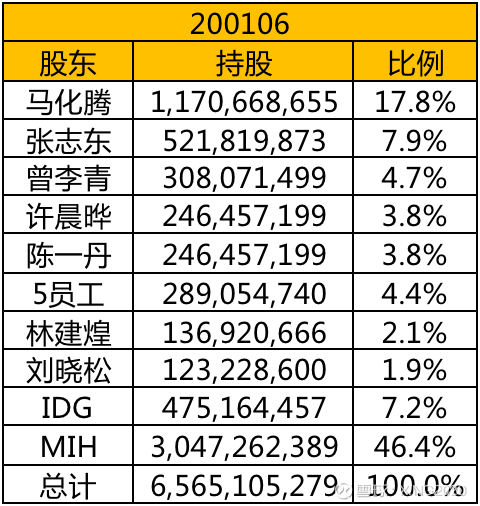
South Africa’s MIH (yes, the one who recently hit the market) acquired 46.4% of the shares, and online information shows that it cost about 32 million US dollars.
Among them, Yingke Digital transferred all 20% of the shares to MIH at a price of 12.6 million US dollars, and the profit was 11 times in two years.
IDG sold about 13% of its holdings for an unknown price, estimated at around $10 million.
Tencent management, early employees, Liu Xiaosong/Lin Jianhuang sold about 13% of the shares together. The sale price is unknown, but it is estimated to be around US$10 million.
4. Two small financings, because the share capital has not changed much, so there is no separate map here
A. In June 2001, when MIH acquired Yingke and IDG shares, Yingke and IDG each spent USD 1 million to exercise the convertible bonds. The USD 2 million was lent to Tencent by Yingke and IDG after Tencent’s first financing.
B. In December 2002, all shareholders were supplemented by rights issue in proportion, raising about 2 million US dollars.
Therefore, the total financing before Tencent’s IPO should be 2.2 million + 2 million + 2 million = 6.2 million US dollars.
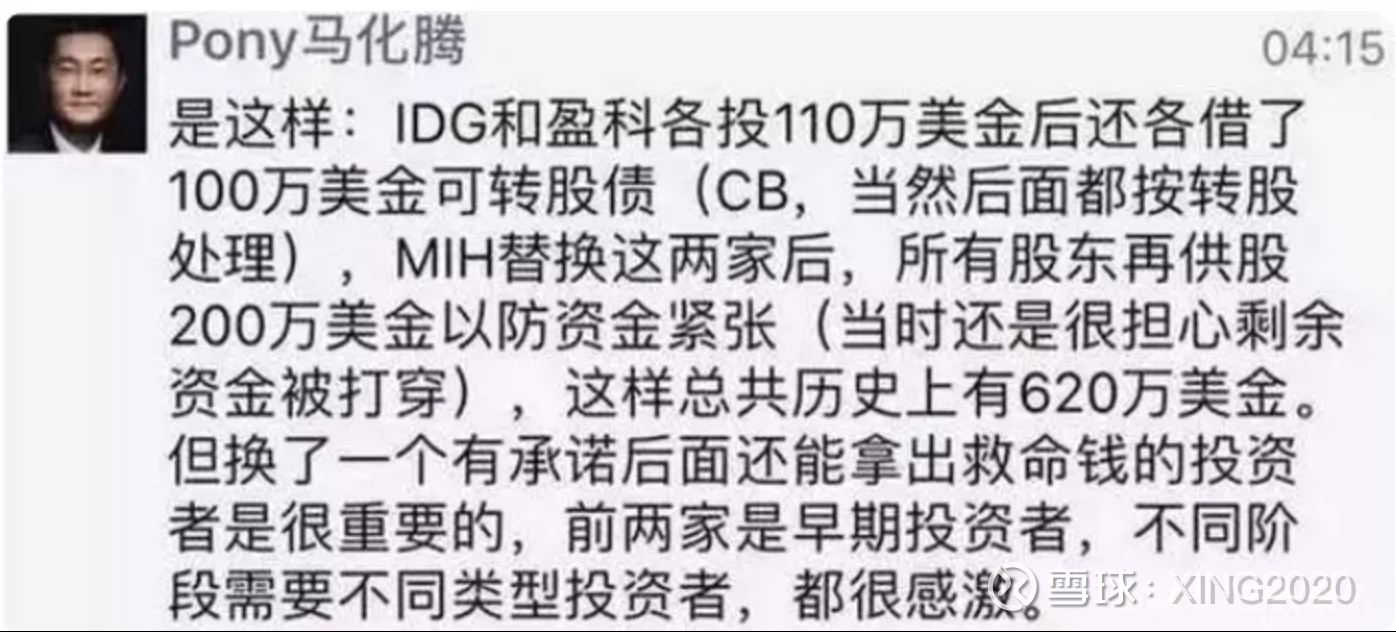
5. Repurchase of IDG and MIH shares August 2003
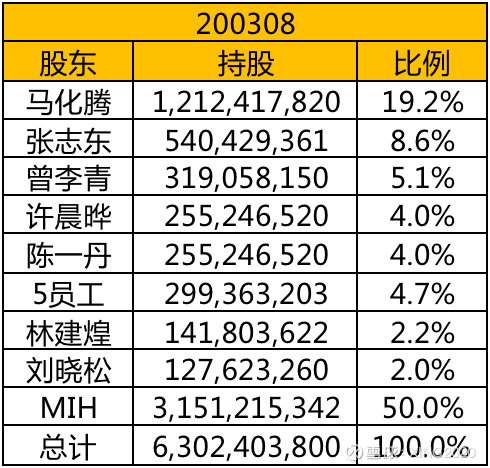
In August 2003, Tencent repurchased all the remaining shares held by IDG, about 490 million shares, at an unknown price. If IDG’s first sale of Tencent shares is excusable, the second sale (10 months before the IPO) is definitely a short-circuit and a cowardly operation. .
At the same time, Tencent repurchased about 4.72 million shares of MIH. After the two repurchases, MIH held 50% of the shares, and Tencent management, early employees, Liu Xiaosong/Lin Jianhuang held a total of 50%.
6. Holding shares after IPO June 2004
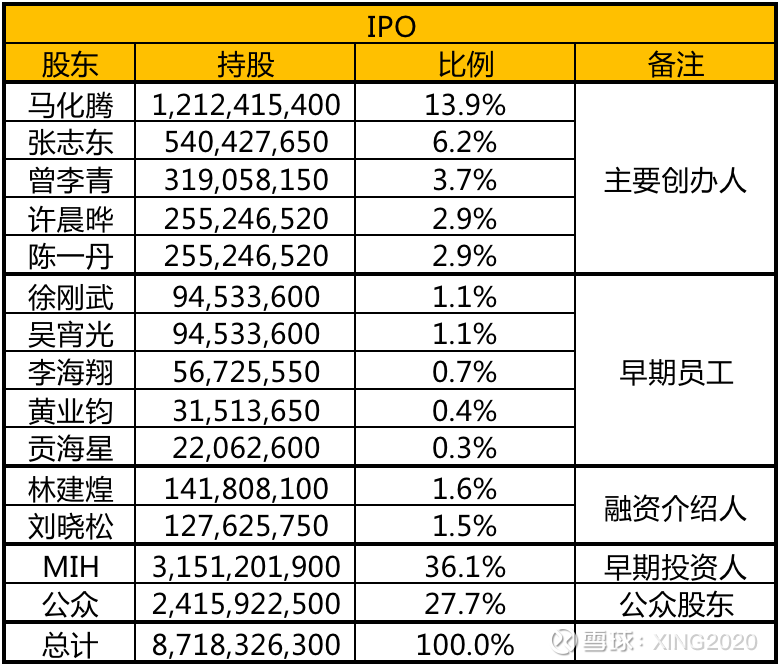
In June 2004, Tencent IPO, issued 2.416 billion shares, the issue price was 0.74 Hong Kong dollars, and raised 1.8 billion Hong Kong dollars (RMB 1.9 billion, 1 Hong Kong dollar = 1.06 RMB).
After the IPO, the five founding shareholders held a total of 29.6%; five early employees held a total of 3.4%; two financing introducers held 3.1%; MIH held 36.1%; the public held 27.7%.
Since then, Tencent has not raised any additional funds, and the subsequent share capital expansion is mainly caused by employee options and restricted share incentives.
7. Management’s shareholding & reduction over the years:
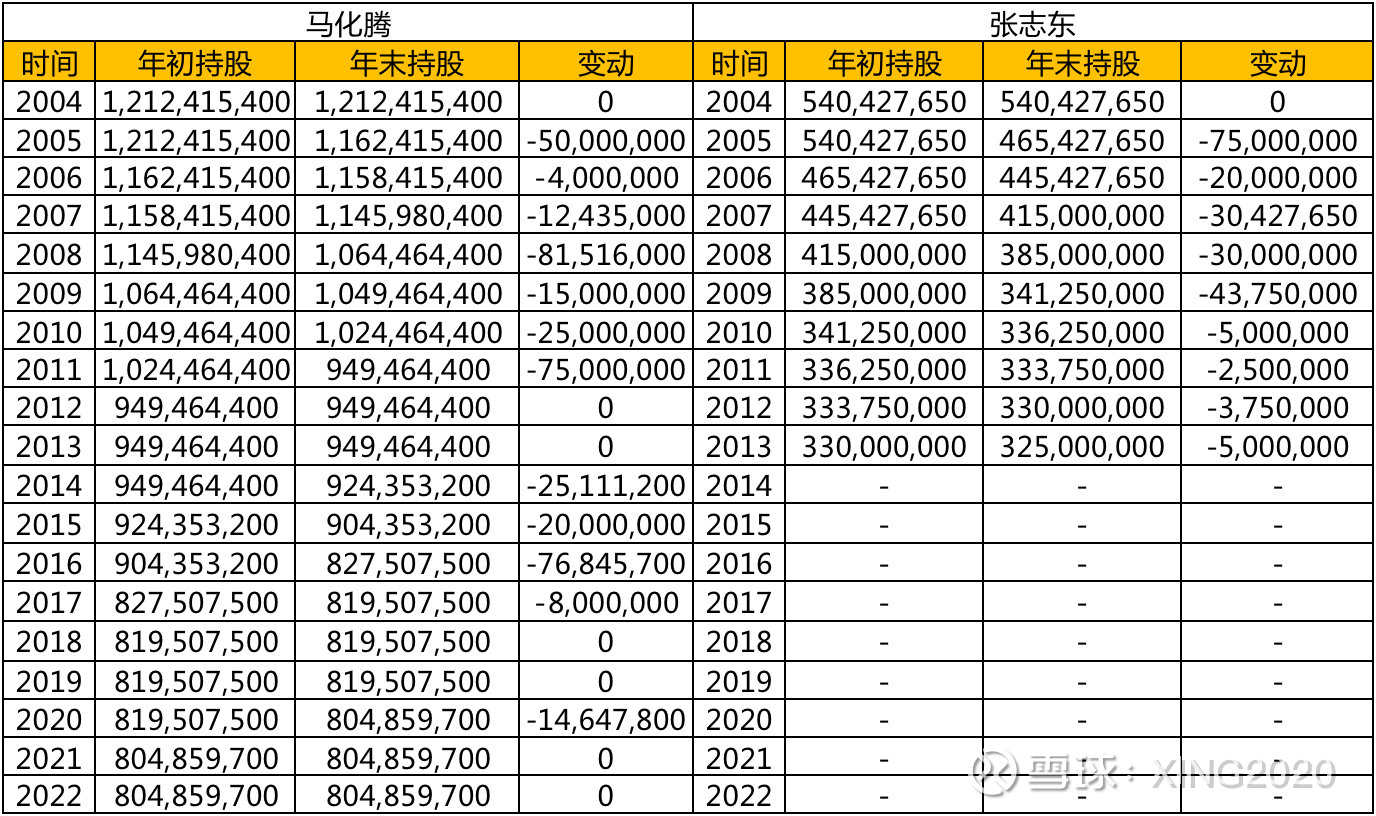
Note: Zhang Zhidong resigned from the board of directors in 2014, and his subsequent shareholdings do not need to be disclosed, and his subsequent shareholdings are unknown.
In the 19 years of listing, Xiaoma has not reduced his holdings in 7 years, and has reduced his holdings in 12 years, with a cumulative reduction of 400 million shares, accounting for 34% of the initial shareholdings.
Zhang Zhidong has reduced his holdings for 9 consecutive years after listing, with a cumulative reduction of 200 million shares, accounting for 40% of the initial shareholding.
Sigh: The boss is no exception, and he is also a layman. It can be said that the two bosses have continued to reduce their holdings a lot after the listing. Who can predict that Tencent will be so powerful in the future? Also, in this regard, MIH is more determined and more discerning. Next, let’s take a look at the reduction operation of MIH.
8. MIH reduction record:

MIH started to hold Tencent in June 2001, and only reduced its holdings for the first time after holding it for 17 years. There are currently three batches of reductions. As of the end of June this year, a total of 460 million shares have been reduced, and a total of about 215.8 billion Hong Kong dollars have been cashed out. It accounts for 14.6% of the initial shareholding, and the reduction ratio is much lower than that of Xiao Ma’s 34% and Zhang Zhidong’s 40%, so there is really nothing to complain about, and the investment will be withdrawn, and there is no need to interpret it too much.
I probably just wrote it here. The mobile phone pop-up window Tencent repurchased 2.38 million shares today at a cost of 600 million, and I felt a lot more comfortable in an instant. I still firmly believe that it is the fundamentals of the company that determine the future stock price. If the fundamentals of the company remain unchanged, the lower the stock price, the more favorable it will be. For the same amount, the lower the price, the greater the number of shares that can be repurchased and cancelled. If Tencent continues to maintain its current repurchase efforts, it is hoped that the stock price will continue to remain at the current low level. Therefore, for friends who are planning to hold Tencent for a long time, Tencent’s current situation is very good – it can advance and retreat, and it is good to be happy when the stock price rises. At this difficult time, we will continue to stick with you, and I believe that Tencent will bring you good returns.
$Tencent Holdings(00700)$ $Alibaba-SW(09988)$ $Kweichow Moutai(SH600519)$ @Today’s Topic
This topic has 13 discussions in Snowball, click to view.
Snowball is an investor’s social network, and smart investors are here.
Click to download Snowball mobile client http://xueqiu.com/xz ]]>
This article is reproduced from: http://xueqiu.com/6490468241/232687030
This site is for inclusion only, and the copyright belongs to the original author.